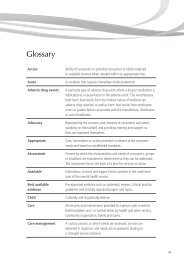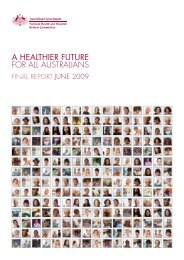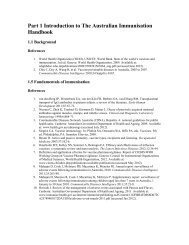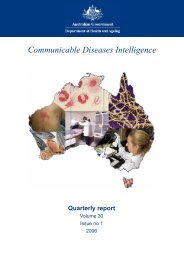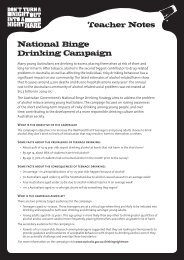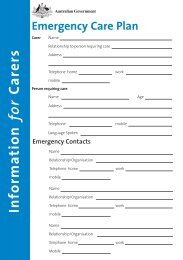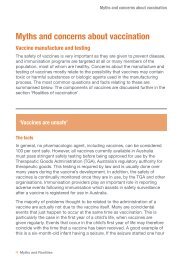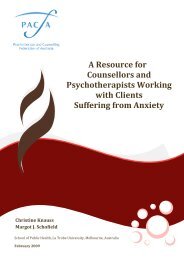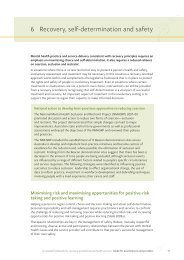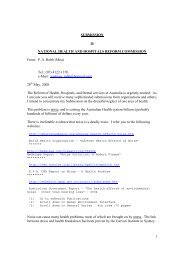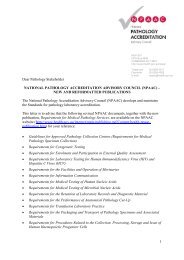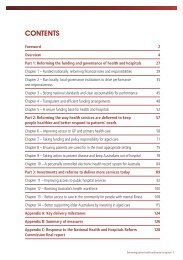National Amphetamine-Type Stimulant Strategy Background Paper
National Amphetamine-Type Stimulant Strategy Background Paper
National Amphetamine-Type Stimulant Strategy Background Paper
You also want an ePaper? Increase the reach of your titles
YUMPU automatically turns print PDFs into web optimized ePapers that Google loves.
121<br />
Drug Misuse Act 1986 (Crime and Misconduct Commission, 2006). Similarly, offences such<br />
as the intention to manufacture amphetamine have been enacted in Queensland, NSW and<br />
Victoria, and are yet to be introduced in other states.<br />
Although the content of the legislation differs in each jurisdiction, the central themes are the<br />
same. Penalties are higher for those found to be dealing in drugs than those possessing<br />
them for their own use, and people convicted of trafficking large amounts of drugs are<br />
liable for a greater penalty than lower level dealers. Drug trafficking is a serious offence<br />
and conviction may result in life imprisonment. Most jurisdictions have enacted legislation<br />
allowing the seizure and forfeiture of assets derived from drug dealing.<br />
Table 6.3: Examples of legislative changes in different jurisdictions<br />
NSW<br />
In 2006, enacted a number of amendments to drug misuse and trafficking laws including listing chemicals that<br />
are precursors to the drug GHB as prohibited drugs and creating a number of new offences including:<br />
• sale, commercial supply or display of crystal methamphetamine pipes in a shop for a commercial purpose;<br />
• exposing a child to the manufacturing or production of a prohibited drug or to chemicals stored for that<br />
purpose; and.<br />
• procuring a child to supply or take part in the supply of a prohibited drug.<br />
In 2006, introduced separate legislation to create a new offence of indoor, hydroponic cultivation of cannabis<br />
plants for a commercial purpose. These new laws also contain supplementary offences of cultivation in the<br />
presence of children.<br />
QLD<br />
In 2006, enacted laws to create a new offence of possession of prescribed substances or items for the<br />
production of a dangerous drug, which has a maximum penalty of 15 years imprisonment. This offence is<br />
aimed at “the developing market for persons who supply illicit methamphetamine manufacturers with chemicals<br />
and apparatus but who do not personally engage in the manufacture of the final dangerous drug. The laws also<br />
create a new offence of possessing a prescribed combination of items for the production of a dangerous drug,<br />
which has a maximum penalty of 25 years imprisonment.<br />
This means that when a clan lab is located and the prescribed combination of items is identified, the remainder<br />
of items seized will not need to be forensically tested as the prosecution will not be seeking to prove that<br />
production has occurred. The laws also introduced evidentiary provisions to remove the requirement for<br />
forensic testing of sealed pharmaceuticals and alleged clan equipment unless challenged by the defence.<br />
Other laws enacted in 2006 allow police to enter pharmacies for the purpose of monitoring excessive sales<br />
of chemicals that are used to make amphetamines such as base.<br />
WA<br />
In 2003, introduced laws that place controls on suppliers of chemicals and apparatus that can be used<br />
in the manufacture of illicit drugs.137<br />
In 2003, also enacted laws to allow police to issue an infringement notice to a person who is reasonably<br />
believed to be cultivating, possessing or using cannabis within the specified limits. Outside these limits,<br />
offenders are subject to criminal prosecution. Persons issued with an infringement notice have the option of<br />
paying the penalty, attending a cannabis education session or having the matter heard in court. This reform<br />
in Western Australia was advocated by the Community Drug Summit held in August 2001. South Australia<br />
introduced a similar scheme in 1986. NSW does not have an infringement notice scheme but in 2000 it<br />
introduced the Cannabis Cautioning Scheme to allow police to issue cautions in relation to minor cannabis<br />
offences.139<br />
In 2004, enacted laws to make it an offence for a declared drug trafficker to consort with another person whom<br />
the police have warned them is also a declared drug trafficker. The maximum penalty is 2 years imprisonment.<br />
In 2005, laws were amended to prohibit the diversion of precursor chemicals and equipment for use in the<br />
illegal manufacture of methamphetamine. The use, sale and supply of drug use paraphernalia such as ‘ice<br />
pipes’ were banned.



